Corporate Law: Assessing Director's Duties and Liabilities Case Study
VerifiedAdded on 2023/04/22
|7
|2395
|454
Case Study
AI Summary
This case study examines potential breaches of director duties under the Corporations Act 2001 (Cth) by Lillian and Gumpta. Lillian, as a director of All Mine Pty Ltd, enters into a contract with Greedyas Pty Ltd, unaware of her company's impending insolvency. Gumpta, the director of Greedyas Pty Ltd, proceeds with the sale despite knowing All Mine Pty Ltd's poor financial condition and further shares confidential merger information with Lillian. The analysis identifies violations of sections 180, 181, 182, 588G, and 1013 of the Corporations Act, highlighting potential civil and criminal liabilities for both directors, including penalties, disqualification, and charges related to insolvent trading and insider trading. The study concludes that Lillian and Gumpta are likely liable for breaching their director duties and could face significant legal consequences.
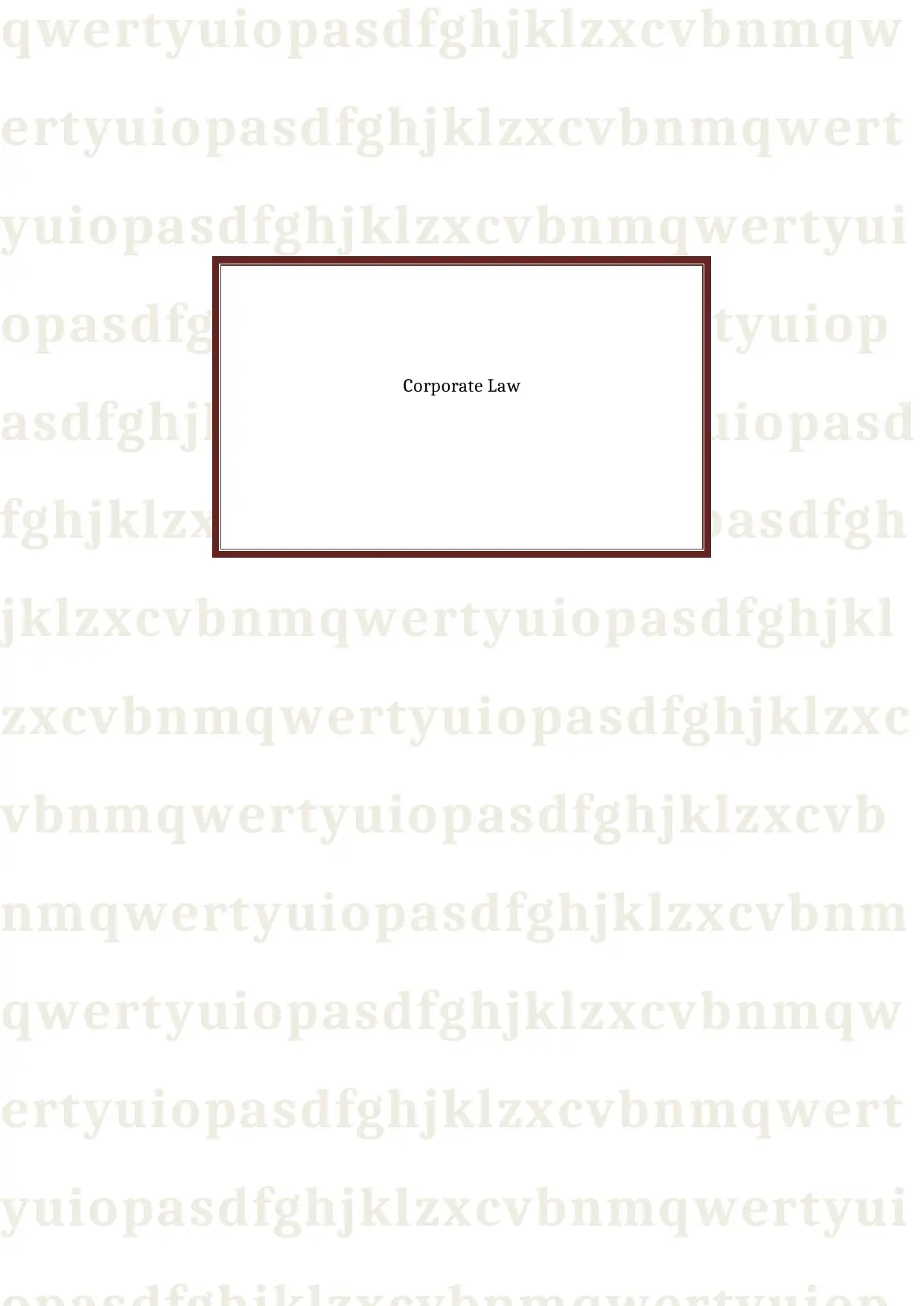
qwertyuiopasdfghjklzxcvbnmqw
ertyuiopasdfghjklzxcvbnmqwert
yuiopasdfghjklzxcvbnmqwertyui
opasdfghjklzxcvbnmqwertyuiop
asdfghjklzxcvbnmqwertyuiopasd
fghjklzxcvbnmqwertyuiopasdfgh
jklzxcvbnmqwertyuiopasdfghjkl
zxcvbnmqwertyuiopasdfghjklzxc
vbnmqwertyuiopasdfghjklzxcvb
nmqwertyuiopasdfghjklzxcvbnm
qwertyuiopasdfghjklzxcvbnmqw
ertyuiopasdfghjklzxcvbnmqwert
yuiopasdfghjklzxcvbnmqwertyui
Corporate Law
ertyuiopasdfghjklzxcvbnmqwert
yuiopasdfghjklzxcvbnmqwertyui
opasdfghjklzxcvbnmqwertyuiop
asdfghjklzxcvbnmqwertyuiopasd
fghjklzxcvbnmqwertyuiopasdfgh
jklzxcvbnmqwertyuiopasdfghjkl
zxcvbnmqwertyuiopasdfghjklzxc
vbnmqwertyuiopasdfghjklzxcvb
nmqwertyuiopasdfghjklzxcvbnm
qwertyuiopasdfghjklzxcvbnmqw
ertyuiopasdfghjklzxcvbnmqwert
yuiopasdfghjklzxcvbnmqwertyui
Corporate Law
Paraphrase This Document
Need a fresh take? Get an instant paraphrase of this document with our AI Paraphraser
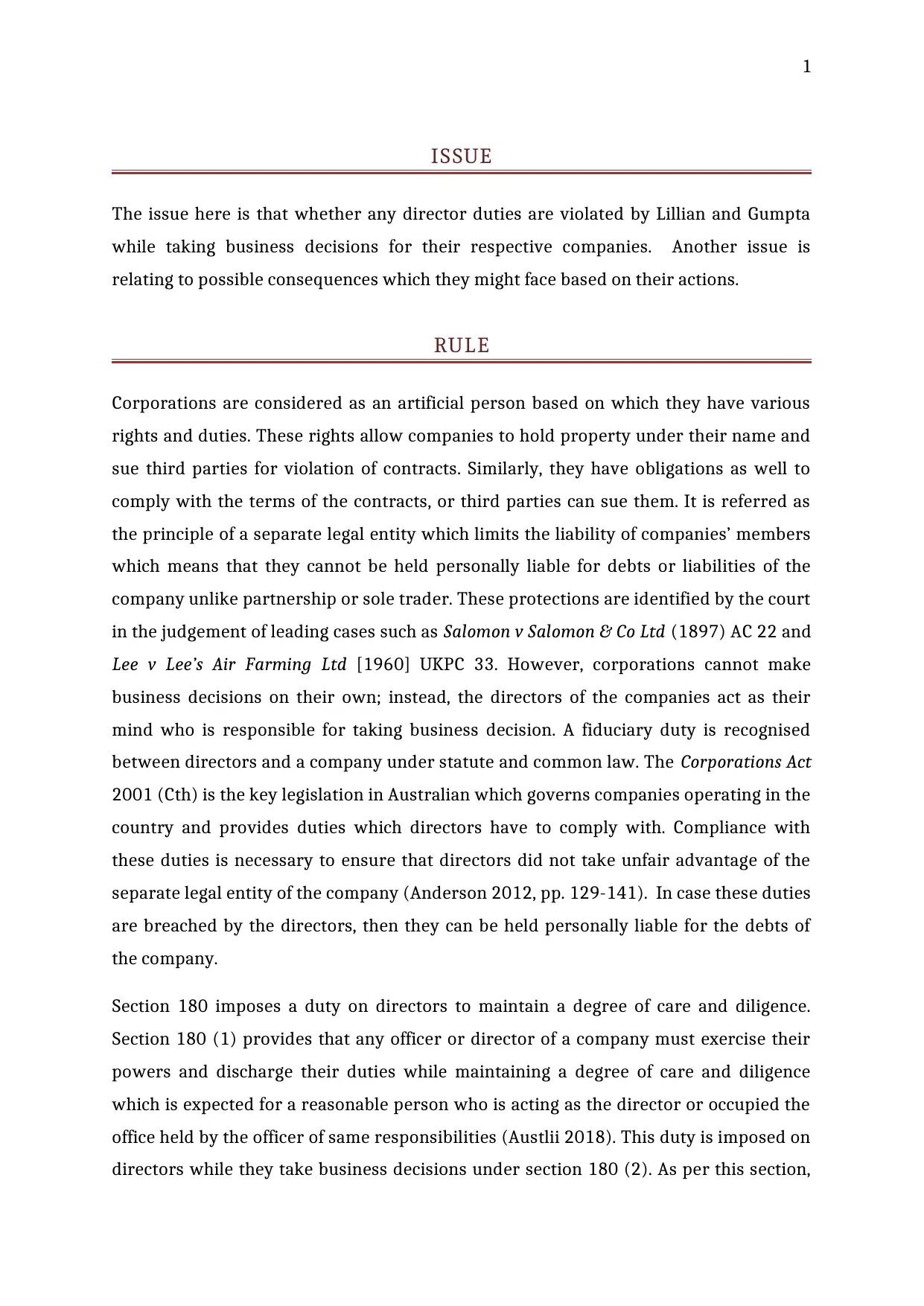
1
ISSUE
The issue here is that whether any director duties are violated by Lillian and Gumpta
while taking business decisions for their respective companies. Another issue is
relating to possible consequences which they might face based on their actions.
RULE
Corporations are considered as an artificial person based on which they have various
rights and duties. These rights allow companies to hold property under their name and
sue third parties for violation of contracts. Similarly, they have obligations as well to
comply with the terms of the contracts, or third parties can sue them. It is referred as
the principle of a separate legal entity which limits the liability of companies’ members
which means that they cannot be held personally liable for debts or liabilities of the
company unlike partnership or sole trader. These protections are identified by the court
in the judgement of leading cases such as Salomon v Salomon & Co Ltd (1897) AC 22 and
Lee v Lee’s Air Farming Ltd [1960] UKPC 33. However, corporations cannot make
business decisions on their own; instead, the directors of the companies act as their
mind who is responsible for taking business decision. A fiduciary duty is recognised
between directors and a company under statute and common law. The Corporations Act
2001 (Cth) is the key legislation in Australian which governs companies operating in the
country and provides duties which directors have to comply with. Compliance with
these duties is necessary to ensure that directors did not take unfair advantage of the
separate legal entity of the company (Anderson 2012, pp. 129-141). In case these duties
are breached by the directors, then they can be held personally liable for the debts of
the company.
Section 180 imposes a duty on directors to maintain a degree of care and diligence.
Section 180 (1) provides that any officer or director of a company must exercise their
powers and discharge their duties while maintaining a degree of care and diligence
which is expected for a reasonable person who is acting as the director or occupied the
office held by the officer of same responsibilities (Austlii 2018). This duty is imposed on
directors while they take business decisions under section 180 (2). As per this section,
ISSUE
The issue here is that whether any director duties are violated by Lillian and Gumpta
while taking business decisions for their respective companies. Another issue is
relating to possible consequences which they might face based on their actions.
RULE
Corporations are considered as an artificial person based on which they have various
rights and duties. These rights allow companies to hold property under their name and
sue third parties for violation of contracts. Similarly, they have obligations as well to
comply with the terms of the contracts, or third parties can sue them. It is referred as
the principle of a separate legal entity which limits the liability of companies’ members
which means that they cannot be held personally liable for debts or liabilities of the
company unlike partnership or sole trader. These protections are identified by the court
in the judgement of leading cases such as Salomon v Salomon & Co Ltd (1897) AC 22 and
Lee v Lee’s Air Farming Ltd [1960] UKPC 33. However, corporations cannot make
business decisions on their own; instead, the directors of the companies act as their
mind who is responsible for taking business decision. A fiduciary duty is recognised
between directors and a company under statute and common law. The Corporations Act
2001 (Cth) is the key legislation in Australian which governs companies operating in the
country and provides duties which directors have to comply with. Compliance with
these duties is necessary to ensure that directors did not take unfair advantage of the
separate legal entity of the company (Anderson 2012, pp. 129-141). In case these duties
are breached by the directors, then they can be held personally liable for the debts of
the company.
Section 180 imposes a duty on directors to maintain a degree of care and diligence.
Section 180 (1) provides that any officer or director of a company must exercise their
powers and discharge their duties while maintaining a degree of care and diligence
which is expected for a reasonable person who is acting as the director or occupied the
office held by the officer of same responsibilities (Austlii 2018). This duty is imposed on
directors while they take business decisions under section 180 (2). As per this section,
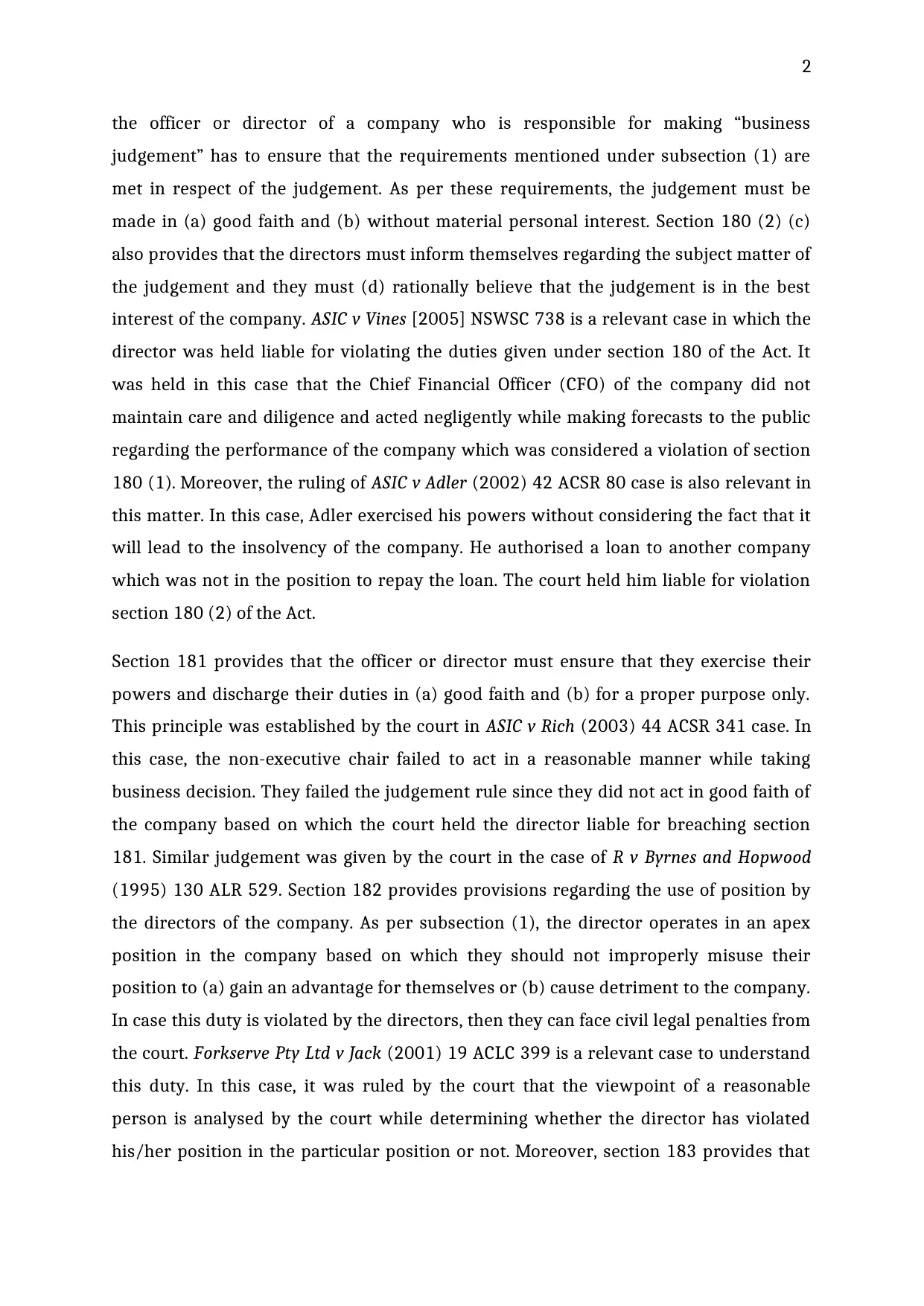
2
the officer or director of a company who is responsible for making “business
judgement” has to ensure that the requirements mentioned under subsection (1) are
met in respect of the judgement. As per these requirements, the judgement must be
made in (a) good faith and (b) without material personal interest. Section 180 (2) (c)
also provides that the directors must inform themselves regarding the subject matter of
the judgement and they must (d) rationally believe that the judgement is in the best
interest of the company. ASIC v Vines [2005] NSWSC 738 is a relevant case in which the
director was held liable for violating the duties given under section 180 of the Act. It
was held in this case that the Chief Financial Officer (CFO) of the company did not
maintain care and diligence and acted negligently while making forecasts to the public
regarding the performance of the company which was considered a violation of section
180 (1). Moreover, the ruling of ASIC v Adler (2002) 42 ACSR 80 case is also relevant in
this matter. In this case, Adler exercised his powers without considering the fact that it
will lead to the insolvency of the company. He authorised a loan to another company
which was not in the position to repay the loan. The court held him liable for violation
section 180 (2) of the Act.
Section 181 provides that the officer or director must ensure that they exercise their
powers and discharge their duties in (a) good faith and (b) for a proper purpose only.
This principle was established by the court in ASIC v Rich (2003) 44 ACSR 341 case. In
this case, the non-executive chair failed to act in a reasonable manner while taking
business decision. They failed the judgement rule since they did not act in good faith of
the company based on which the court held the director liable for breaching section
181. Similar judgement was given by the court in the case of R v Byrnes and Hopwood
(1995) 130 ALR 529. Section 182 provides provisions regarding the use of position by
the directors of the company. As per subsection (1), the director operates in an apex
position in the company based on which they should not improperly misuse their
position to (a) gain an advantage for themselves or (b) cause detriment to the company.
In case this duty is violated by the directors, then they can face civil legal penalties from
the court. Forkserve Pty Ltd v Jack (2001) 19 ACLC 399 is a relevant case to understand
this duty. In this case, it was ruled by the court that the viewpoint of a reasonable
person is analysed by the court while determining whether the director has violated
his/her position in the particular position or not. Moreover, section 183 provides that
the officer or director of a company who is responsible for making “business
judgement” has to ensure that the requirements mentioned under subsection (1) are
met in respect of the judgement. As per these requirements, the judgement must be
made in (a) good faith and (b) without material personal interest. Section 180 (2) (c)
also provides that the directors must inform themselves regarding the subject matter of
the judgement and they must (d) rationally believe that the judgement is in the best
interest of the company. ASIC v Vines [2005] NSWSC 738 is a relevant case in which the
director was held liable for violating the duties given under section 180 of the Act. It
was held in this case that the Chief Financial Officer (CFO) of the company did not
maintain care and diligence and acted negligently while making forecasts to the public
regarding the performance of the company which was considered a violation of section
180 (1). Moreover, the ruling of ASIC v Adler (2002) 42 ACSR 80 case is also relevant in
this matter. In this case, Adler exercised his powers without considering the fact that it
will lead to the insolvency of the company. He authorised a loan to another company
which was not in the position to repay the loan. The court held him liable for violation
section 180 (2) of the Act.
Section 181 provides that the officer or director must ensure that they exercise their
powers and discharge their duties in (a) good faith and (b) for a proper purpose only.
This principle was established by the court in ASIC v Rich (2003) 44 ACSR 341 case. In
this case, the non-executive chair failed to act in a reasonable manner while taking
business decision. They failed the judgement rule since they did not act in good faith of
the company based on which the court held the director liable for breaching section
181. Similar judgement was given by the court in the case of R v Byrnes and Hopwood
(1995) 130 ALR 529. Section 182 provides provisions regarding the use of position by
the directors of the company. As per subsection (1), the director operates in an apex
position in the company based on which they should not improperly misuse their
position to (a) gain an advantage for themselves or (b) cause detriment to the company.
In case this duty is violated by the directors, then they can face civil legal penalties from
the court. Forkserve Pty Ltd v Jack (2001) 19 ACLC 399 is a relevant case to understand
this duty. In this case, it was ruled by the court that the viewpoint of a reasonable
person is analysed by the court while determining whether the director has violated
his/her position in the particular position or not. Moreover, section 183 provides that
⊘ This is a preview!⊘
Do you want full access?
Subscribe today to unlock all pages.

Trusted by 1+ million students worldwide
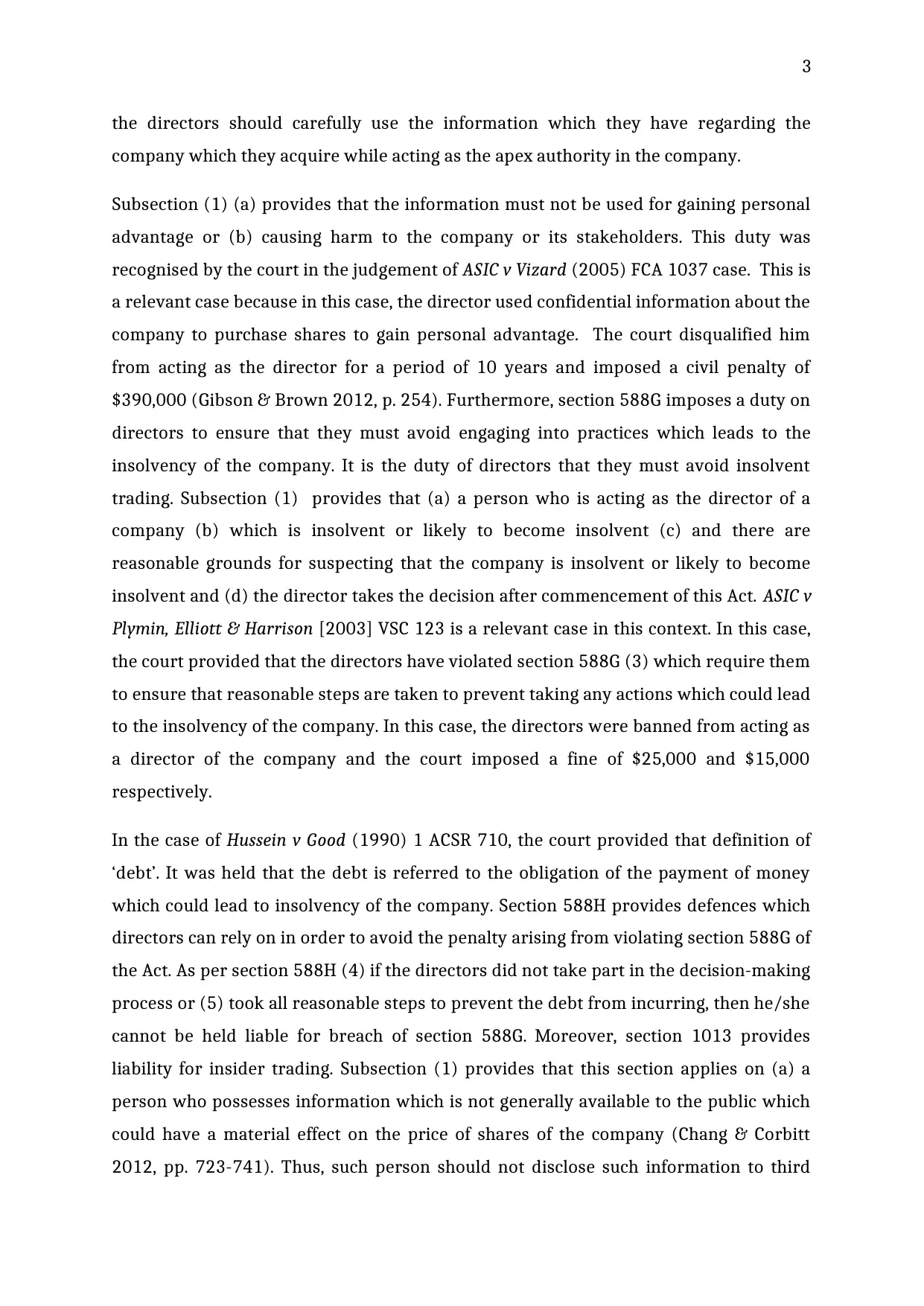
3
the directors should carefully use the information which they have regarding the
company which they acquire while acting as the apex authority in the company.
Subsection (1) (a) provides that the information must not be used for gaining personal
advantage or (b) causing harm to the company or its stakeholders. This duty was
recognised by the court in the judgement of ASIC v Vizard (2005) FCA 1037 case. This is
a relevant case because in this case, the director used confidential information about the
company to purchase shares to gain personal advantage. The court disqualified him
from acting as the director for a period of 10 years and imposed a civil penalty of
$390,000 (Gibson & Brown 2012, p. 254). Furthermore, section 588G imposes a duty on
directors to ensure that they must avoid engaging into practices which leads to the
insolvency of the company. It is the duty of directors that they must avoid insolvent
trading. Subsection (1) provides that (a) a person who is acting as the director of a
company (b) which is insolvent or likely to become insolvent (c) and there are
reasonable grounds for suspecting that the company is insolvent or likely to become
insolvent and (d) the director takes the decision after commencement of this Act. ASIC v
Plymin, Elliott & Harrison [2003] VSC 123 is a relevant case in this context. In this case,
the court provided that the directors have violated section 588G (3) which require them
to ensure that reasonable steps are taken to prevent taking any actions which could lead
to the insolvency of the company. In this case, the directors were banned from acting as
a director of the company and the court imposed a fine of $25,000 and $15,000
respectively.
In the case of Hussein v Good (1990) 1 ACSR 710, the court provided that definition of
‘debt’. It was held that the debt is referred to the obligation of the payment of money
which could lead to insolvency of the company. Section 588H provides defences which
directors can rely on in order to avoid the penalty arising from violating section 588G of
the Act. As per section 588H (4) if the directors did not take part in the decision-making
process or (5) took all reasonable steps to prevent the debt from incurring, then he/she
cannot be held liable for breach of section 588G. Moreover, section 1013 provides
liability for insider trading. Subsection (1) provides that this section applies on (a) a
person who possesses information which is not generally available to the public which
could have a material effect on the price of shares of the company (Chang & Corbitt
2012, pp. 723-741). Thus, such person should not disclose such information to third
the directors should carefully use the information which they have regarding the
company which they acquire while acting as the apex authority in the company.
Subsection (1) (a) provides that the information must not be used for gaining personal
advantage or (b) causing harm to the company or its stakeholders. This duty was
recognised by the court in the judgement of ASIC v Vizard (2005) FCA 1037 case. This is
a relevant case because in this case, the director used confidential information about the
company to purchase shares to gain personal advantage. The court disqualified him
from acting as the director for a period of 10 years and imposed a civil penalty of
$390,000 (Gibson & Brown 2012, p. 254). Furthermore, section 588G imposes a duty on
directors to ensure that they must avoid engaging into practices which leads to the
insolvency of the company. It is the duty of directors that they must avoid insolvent
trading. Subsection (1) provides that (a) a person who is acting as the director of a
company (b) which is insolvent or likely to become insolvent (c) and there are
reasonable grounds for suspecting that the company is insolvent or likely to become
insolvent and (d) the director takes the decision after commencement of this Act. ASIC v
Plymin, Elliott & Harrison [2003] VSC 123 is a relevant case in this context. In this case,
the court provided that the directors have violated section 588G (3) which require them
to ensure that reasonable steps are taken to prevent taking any actions which could lead
to the insolvency of the company. In this case, the directors were banned from acting as
a director of the company and the court imposed a fine of $25,000 and $15,000
respectively.
In the case of Hussein v Good (1990) 1 ACSR 710, the court provided that definition of
‘debt’. It was held that the debt is referred to the obligation of the payment of money
which could lead to insolvency of the company. Section 588H provides defences which
directors can rely on in order to avoid the penalty arising from violating section 588G of
the Act. As per section 588H (4) if the directors did not take part in the decision-making
process or (5) took all reasonable steps to prevent the debt from incurring, then he/she
cannot be held liable for breach of section 588G. Moreover, section 1013 provides
liability for insider trading. Subsection (1) provides that this section applies on (a) a
person who possesses information which is not generally available to the public which
could have a material effect on the price of shares of the company (Chang & Corbitt
2012, pp. 723-741). Thus, such person should not disclose such information to third
Paraphrase This Document
Need a fresh take? Get an instant paraphrase of this document with our AI Paraphraser
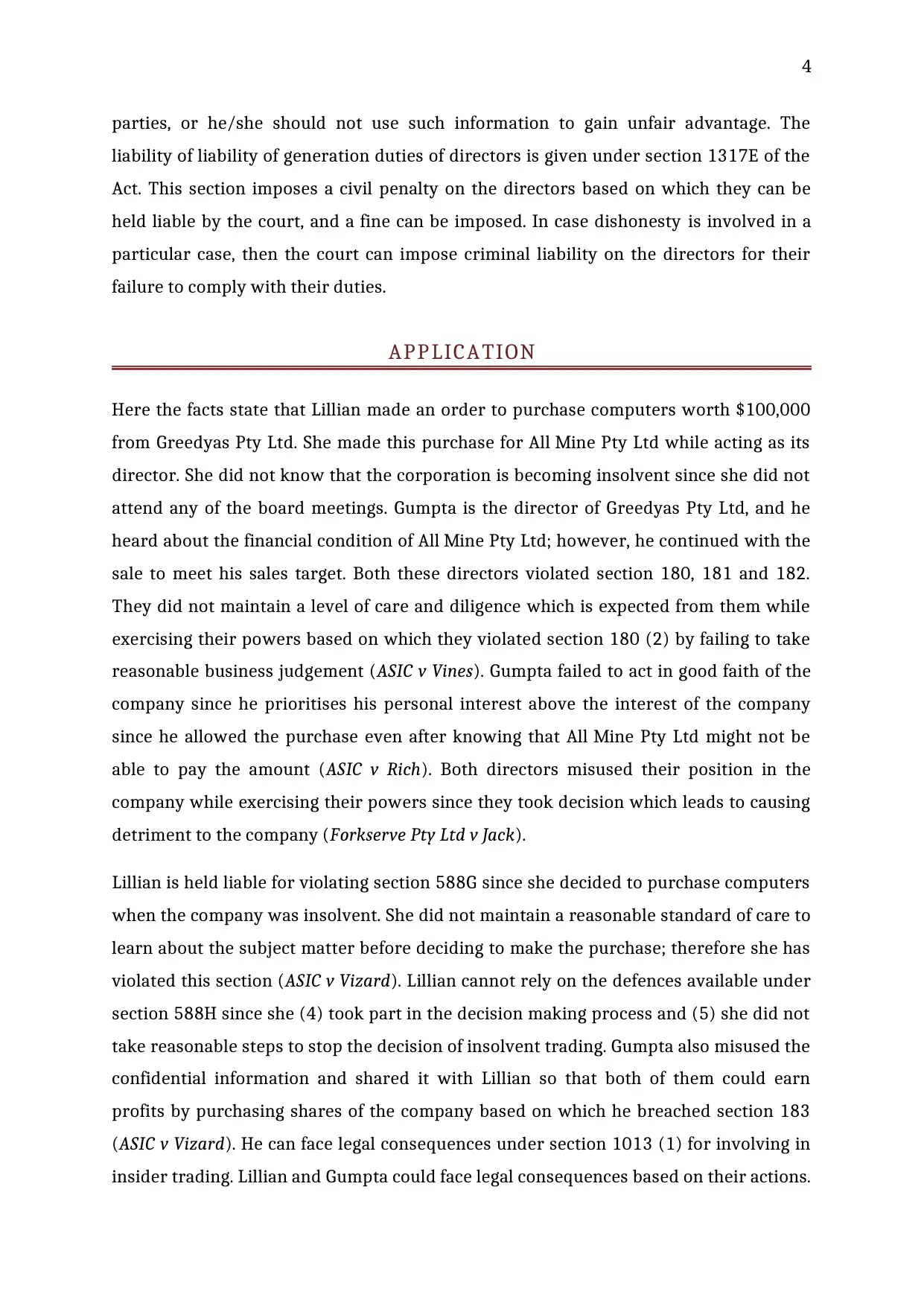
4
parties, or he/she should not use such information to gain unfair advantage. The
liability of liability of generation duties of directors is given under section 1317E of the
Act. This section imposes a civil penalty on the directors based on which they can be
held liable by the court, and a fine can be imposed. In case dishonesty is involved in a
particular case, then the court can impose criminal liability on the directors for their
failure to comply with their duties.
APPLICATION
Here the facts state that Lillian made an order to purchase computers worth $100,000
from Greedyas Pty Ltd. She made this purchase for All Mine Pty Ltd while acting as its
director. She did not know that the corporation is becoming insolvent since she did not
attend any of the board meetings. Gumpta is the director of Greedyas Pty Ltd, and he
heard about the financial condition of All Mine Pty Ltd; however, he continued with the
sale to meet his sales target. Both these directors violated section 180, 181 and 182.
They did not maintain a level of care and diligence which is expected from them while
exercising their powers based on which they violated section 180 (2) by failing to take
reasonable business judgement (ASIC v Vines). Gumpta failed to act in good faith of the
company since he prioritises his personal interest above the interest of the company
since he allowed the purchase even after knowing that All Mine Pty Ltd might not be
able to pay the amount (ASIC v Rich). Both directors misused their position in the
company while exercising their powers since they took decision which leads to causing
detriment to the company (Forkserve Pty Ltd v Jack).
Lillian is held liable for violating section 588G since she decided to purchase computers
when the company was insolvent. She did not maintain a reasonable standard of care to
learn about the subject matter before deciding to make the purchase; therefore she has
violated this section (ASIC v Vizard). Lillian cannot rely on the defences available under
section 588H since she (4) took part in the decision making process and (5) she did not
take reasonable steps to stop the decision of insolvent trading. Gumpta also misused the
confidential information and shared it with Lillian so that both of them could earn
profits by purchasing shares of the company based on which he breached section 183
(ASIC v Vizard). He can face legal consequences under section 1013 (1) for involving in
insider trading. Lillian and Gumpta could face legal consequences based on their actions.
parties, or he/she should not use such information to gain unfair advantage. The
liability of liability of generation duties of directors is given under section 1317E of the
Act. This section imposes a civil penalty on the directors based on which they can be
held liable by the court, and a fine can be imposed. In case dishonesty is involved in a
particular case, then the court can impose criminal liability on the directors for their
failure to comply with their duties.
APPLICATION
Here the facts state that Lillian made an order to purchase computers worth $100,000
from Greedyas Pty Ltd. She made this purchase for All Mine Pty Ltd while acting as its
director. She did not know that the corporation is becoming insolvent since she did not
attend any of the board meetings. Gumpta is the director of Greedyas Pty Ltd, and he
heard about the financial condition of All Mine Pty Ltd; however, he continued with the
sale to meet his sales target. Both these directors violated section 180, 181 and 182.
They did not maintain a level of care and diligence which is expected from them while
exercising their powers based on which they violated section 180 (2) by failing to take
reasonable business judgement (ASIC v Vines). Gumpta failed to act in good faith of the
company since he prioritises his personal interest above the interest of the company
since he allowed the purchase even after knowing that All Mine Pty Ltd might not be
able to pay the amount (ASIC v Rich). Both directors misused their position in the
company while exercising their powers since they took decision which leads to causing
detriment to the company (Forkserve Pty Ltd v Jack).
Lillian is held liable for violating section 588G since she decided to purchase computers
when the company was insolvent. She did not maintain a reasonable standard of care to
learn about the subject matter before deciding to make the purchase; therefore she has
violated this section (ASIC v Vizard). Lillian cannot rely on the defences available under
section 588H since she (4) took part in the decision making process and (5) she did not
take reasonable steps to stop the decision of insolvent trading. Gumpta also misused the
confidential information and shared it with Lillian so that both of them could earn
profits by purchasing shares of the company based on which he breached section 183
(ASIC v Vizard). He can face legal consequences under section 1013 (1) for involving in
insider trading. Lillian and Gumpta could face legal consequences based on their actions.
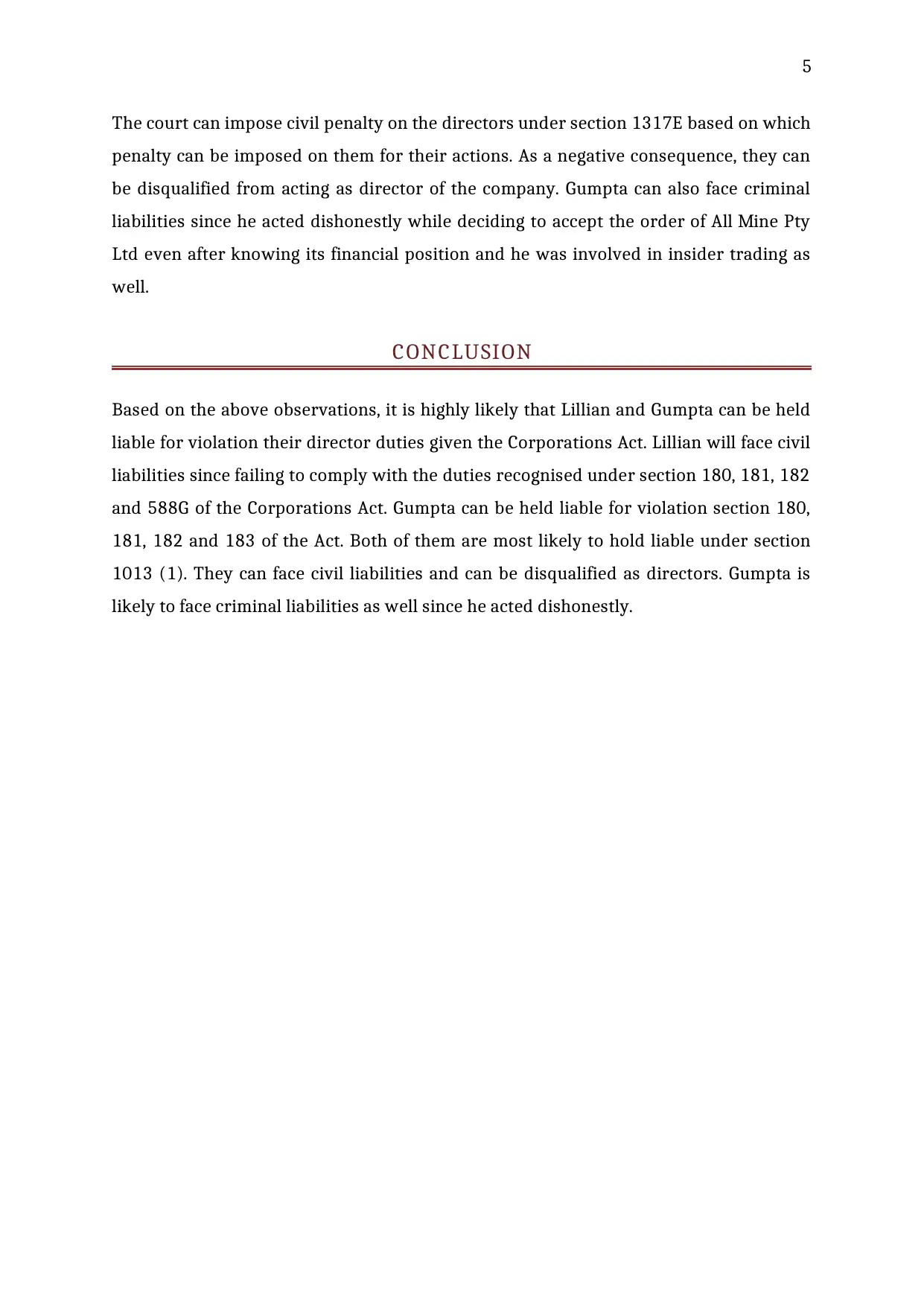
5
The court can impose civil penalty on the directors under section 1317E based on which
penalty can be imposed on them for their actions. As a negative consequence, they can
be disqualified from acting as director of the company. Gumpta can also face criminal
liabilities since he acted dishonestly while deciding to accept the order of All Mine Pty
Ltd even after knowing its financial position and he was involved in insider trading as
well.
CONCLUSION
Based on the above observations, it is highly likely that Lillian and Gumpta can be held
liable for violation their director duties given the Corporations Act. Lillian will face civil
liabilities since failing to comply with the duties recognised under section 180, 181, 182
and 588G of the Corporations Act. Gumpta can be held liable for violation section 180,
181, 182 and 183 of the Act. Both of them are most likely to hold liable under section
1013 (1). They can face civil liabilities and can be disqualified as directors. Gumpta is
likely to face criminal liabilities as well since he acted dishonestly.
The court can impose civil penalty on the directors under section 1317E based on which
penalty can be imposed on them for their actions. As a negative consequence, they can
be disqualified from acting as director of the company. Gumpta can also face criminal
liabilities since he acted dishonestly while deciding to accept the order of All Mine Pty
Ltd even after knowing its financial position and he was involved in insider trading as
well.
CONCLUSION
Based on the above observations, it is highly likely that Lillian and Gumpta can be held
liable for violation their director duties given the Corporations Act. Lillian will face civil
liabilities since failing to comply with the duties recognised under section 180, 181, 182
and 588G of the Corporations Act. Gumpta can be held liable for violation section 180,
181, 182 and 183 of the Act. Both of them are most likely to hold liable under section
1013 (1). They can face civil liabilities and can be disqualified as directors. Gumpta is
likely to face criminal liabilities as well since he acted dishonestly.
⊘ This is a preview!⊘
Do you want full access?
Subscribe today to unlock all pages.

Trusted by 1+ million students worldwide
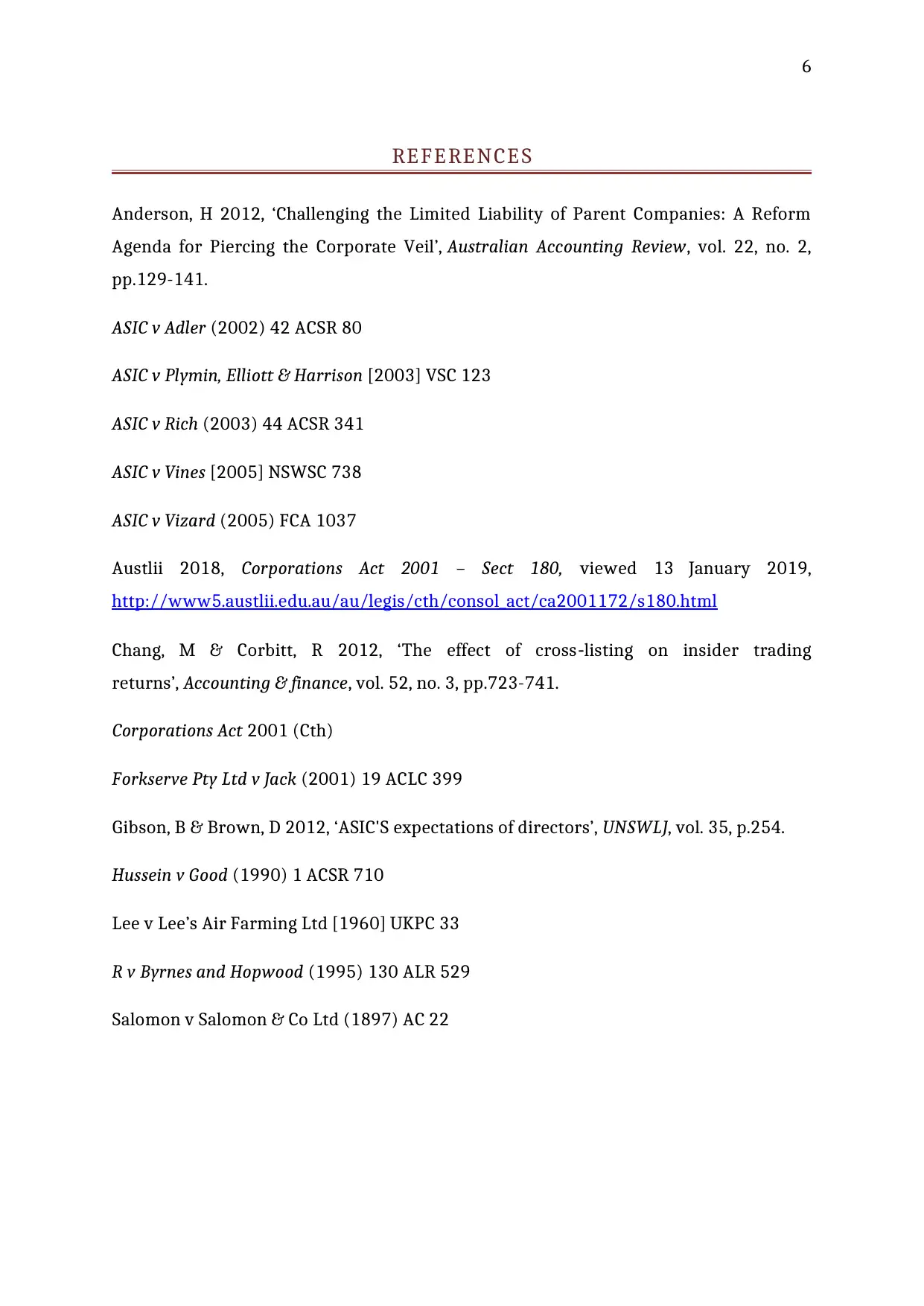
6
REFERENCES
Anderson, H 2012, ‘Challenging the Limited Liability of Parent Companies: A Reform
Agenda for Piercing the Corporate Veil’, Australian Accounting Review, vol. 22, no. 2,
pp.129-141.
ASIC v Adler (2002) 42 ACSR 80
ASIC v Plymin, Elliott & Harrison [2003] VSC 123
ASIC v Rich (2003) 44 ACSR 341
ASIC v Vines [2005] NSWSC 738
ASIC v Vizard (2005) FCA 1037
Austlii 2018, Corporations Act 2001 – Sect 180, viewed 13 January 2019,
http://www5.austlii.edu.au/au/legis/cth/consol_act/ca2001172/s180.html
Chang, M & Corbitt, R 2012, ‘The effect of cross‐listing on insider trading
returns’, Accounting & finance, vol. 52, no. 3, pp.723-741.
Corporations Act 2001 (Cth)
Forkserve Pty Ltd v Jack (2001) 19 ACLC 399
Gibson, B & Brown, D 2012, ‘ASIC'S expectations of directors’, UNSWLJ, vol. 35, p.254.
Hussein v Good (1990) 1 ACSR 710
Lee v Lee’s Air Farming Ltd [1960] UKPC 33
R v Byrnes and Hopwood (1995) 130 ALR 529
Salomon v Salomon & Co Ltd (1897) AC 22
REFERENCES
Anderson, H 2012, ‘Challenging the Limited Liability of Parent Companies: A Reform
Agenda for Piercing the Corporate Veil’, Australian Accounting Review, vol. 22, no. 2,
pp.129-141.
ASIC v Adler (2002) 42 ACSR 80
ASIC v Plymin, Elliott & Harrison [2003] VSC 123
ASIC v Rich (2003) 44 ACSR 341
ASIC v Vines [2005] NSWSC 738
ASIC v Vizard (2005) FCA 1037
Austlii 2018, Corporations Act 2001 – Sect 180, viewed 13 January 2019,
http://www5.austlii.edu.au/au/legis/cth/consol_act/ca2001172/s180.html
Chang, M & Corbitt, R 2012, ‘The effect of cross‐listing on insider trading
returns’, Accounting & finance, vol. 52, no. 3, pp.723-741.
Corporations Act 2001 (Cth)
Forkserve Pty Ltd v Jack (2001) 19 ACLC 399
Gibson, B & Brown, D 2012, ‘ASIC'S expectations of directors’, UNSWLJ, vol. 35, p.254.
Hussein v Good (1990) 1 ACSR 710
Lee v Lee’s Air Farming Ltd [1960] UKPC 33
R v Byrnes and Hopwood (1995) 130 ALR 529
Salomon v Salomon & Co Ltd (1897) AC 22
1 out of 7
Related Documents
Your All-in-One AI-Powered Toolkit for Academic Success.
+13062052269
info@desklib.com
Available 24*7 on WhatsApp / Email
![[object Object]](/_next/static/media/star-bottom.7253800d.svg)
Unlock your academic potential
Copyright © 2020–2026 A2Z Services. All Rights Reserved. Developed and managed by ZUCOL.




